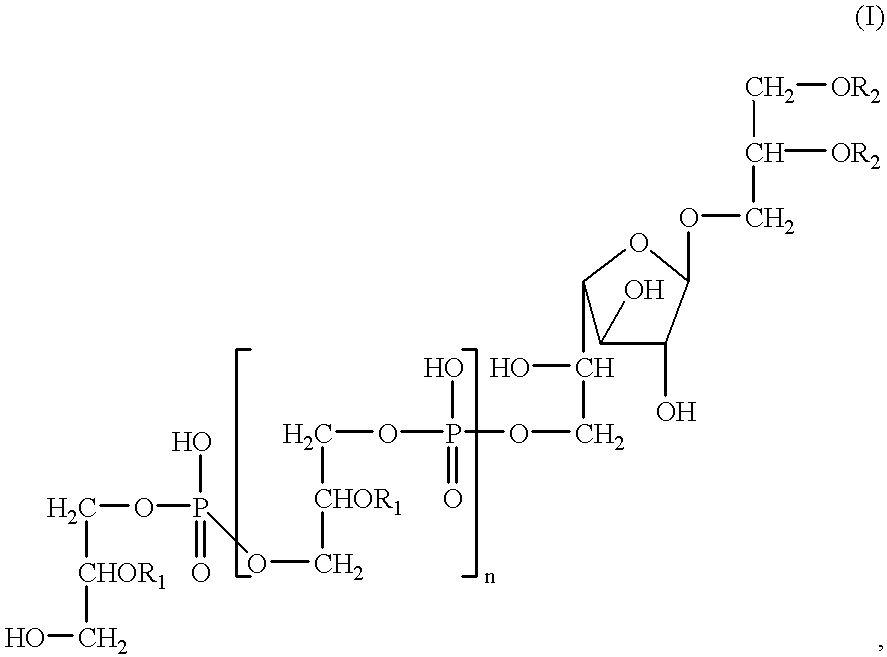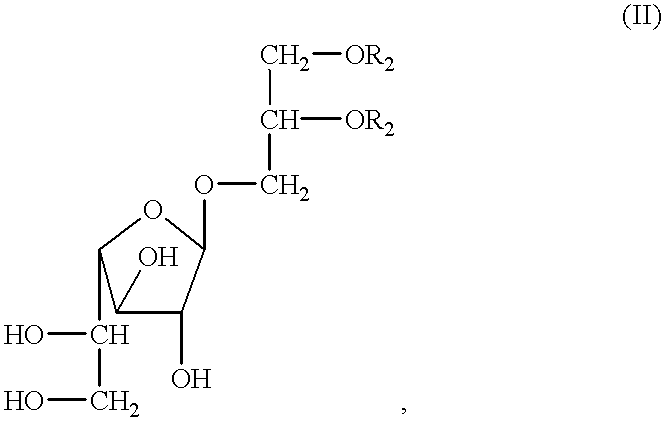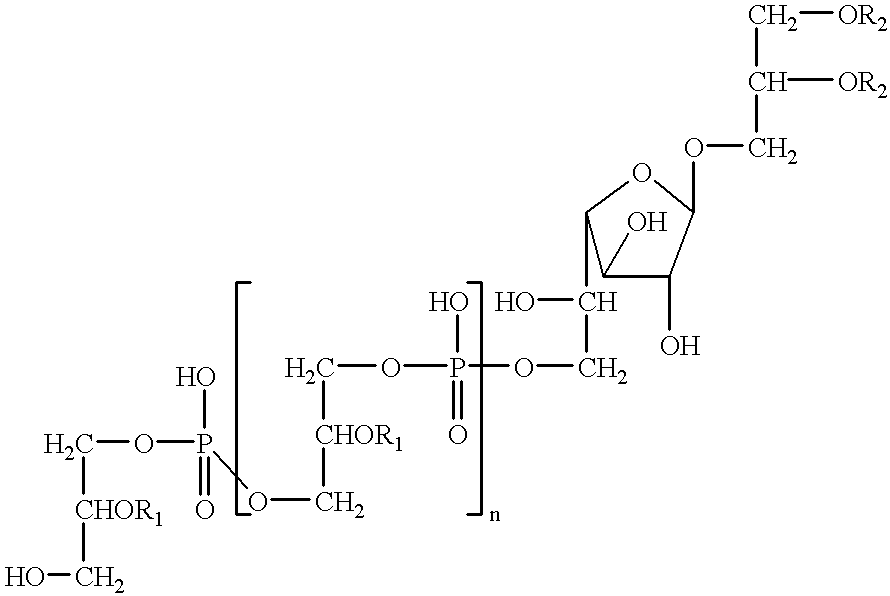Antitumor and anticholesterol preparations containing a lipoteichoic acid from streptococcus
a technology of lipoteichoic acid and anticholesterol, which is applied in the direction of sugar derivatives, biochemistry apparatus and processes, and esterified saccharide compounds, etc., can solve problems such as being pulled from the market, and achieve the effect of improving the availability of medicaments and improving flow properties
- Summary
- Abstract
- Description
- Claims
- Application Information
AI Technical Summary
Benefits of technology
Problems solved by technology
Method used
Image
Examples
example 2
Isolation and Purification of lipoteichoic acid LTA-T
When not mentioned otherwise all steps are accomplished at 4.degree. C.
A suspension (250 ml) of bacteria cells DSM 8747 in 0.1 M citrate buffer pH 3.0 (400 g wet weight per liter, obtained as described in Example 1) is mixed with an equal volume of glass beads (Braun Melsungen, .theta.0.17-0.18 mm) and agitated under cooling in a Braun disintegrator fitted with a CO.sub.2 cooling device for 6 min. The suspension of broken cells is decanted through a glass filter G1 and the remaining glass beads are washed with 0.1 M of sodium acetate pH 4.7. The combined filtrate and washing fluid is adjusted to pH 4.7 with 1 M NaHCO.sub.3. The crude suspension is extracted in an equal volume of 80:20 (v / v) phenol / water at 68.degree. C. for 1 hour. After cooling, the water phase is separated by centrifugation at 3000 rpm (1800 g) for 30 minutes. The upper water phase is collected and an equal volume of 0.1 M sodiumacetate buffer pH 4.7 is added to...
example 3
Structural Characterization
The purified LTA is submitted to HF hydrolysis (48% HF, 36 h, 2.degree. C.) and the hydrophilic part (products of the backbone) and the hydrophobic part (lipidanchor) separated by Folch partition [Folch J., Lees M., Sloane-Stanley G. H. S. (1957), a simple method for the isolation and purification of total lipids from animal tissues, J. Biol. Chem., 226: 497-509] in chloroform:methanol:water (1:0.9:0.0).
The two parts are analyzed separately. The core of the lipid anchor is analysed after deacylation as partially methylated alditol acetate by GLC-MS analysis. The typical fragmentation pattern of 1,2-dimethyl-3-acetyl-glycerol and 2,3,5,6-tetra-0-methyl-1,4-di-0-acetyl-galactitol can be observed. The hydrophilic products are analyzed by GLC (gas liquid chromatography) before and after HCl hydrolysis or alkaline dealanylation. Thereby no sugars are detected.
For molecular composition the LTA is hydrolysed with 2M HCl for 2.5 hours at 100.degree. C. and afterwa...
example 4
Preparation of Deacyl-LTA-T (dLTA-T)
LTA-T is submitted to mild alcaline hydrolysis (0.1M NaOH, 1 h, 37.degree. C.). The solution is adjusted to pH 3 with HCl and the fatty acids are extracted four times with petroleum-ether:chloroform (4:1). The water solution is neutralized with NaOH and extensively dialysed against water in a tubing with a cut off of 2 kD. The product in the retentate is LTA-T without alanine esters and without fatty acids and is called dLTA-T.
PUM
| Property | Measurement | Unit |
|---|---|---|
| molar ratio | aaaaa | aaaaa |
| molar ratio | aaaaa | aaaaa |
| pH | aaaaa | aaaaa |
Abstract
Description
Claims
Application Information
 Login to View More
Login to View More - R&D
- Intellectual Property
- Life Sciences
- Materials
- Tech Scout
- Unparalleled Data Quality
- Higher Quality Content
- 60% Fewer Hallucinations
Browse by: Latest US Patents, China's latest patents, Technical Efficacy Thesaurus, Application Domain, Technology Topic, Popular Technical Reports.
© 2025 PatSnap. All rights reserved.Legal|Privacy policy|Modern Slavery Act Transparency Statement|Sitemap|About US| Contact US: help@patsnap.com



